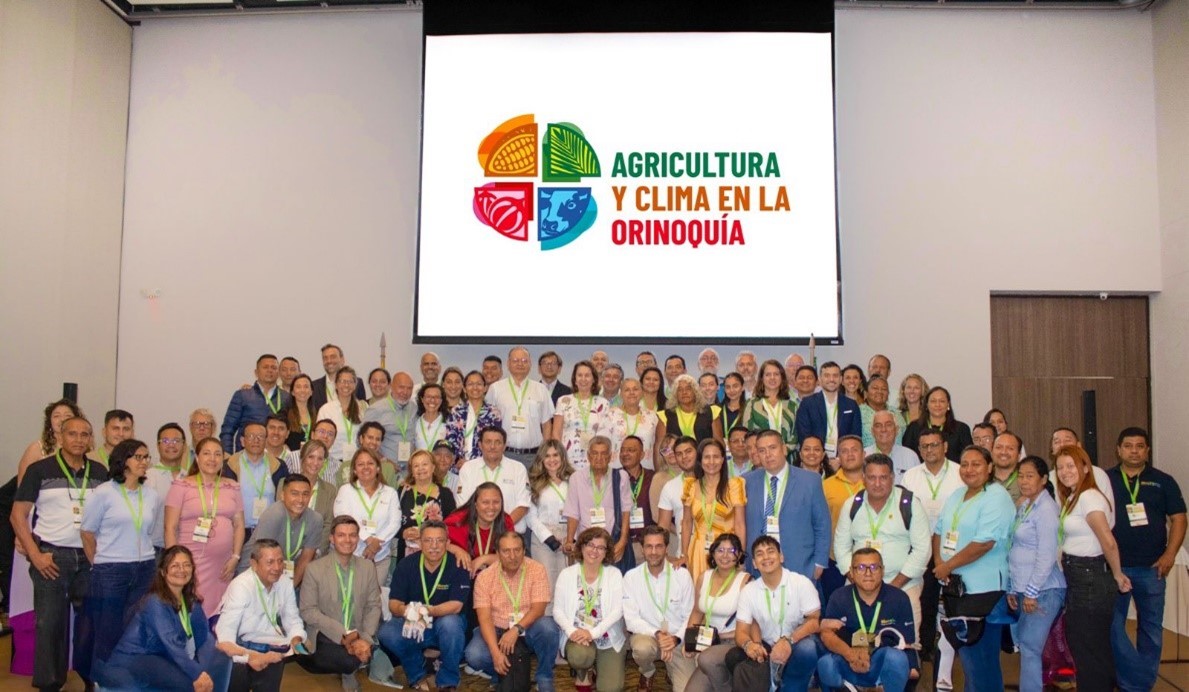Driving Change: Private Sector Boosts Sustainable Agriculture in Colombia's Orinoquía
Driving Change: Private Sector Boosts Sustainable Agriculture in Colombia's Orinoquía

Highlights from the "Agriculture & Climate in Orinoquía" Forum in Villavicencio, Colombia
For two days, over one hundred stakeholders – including farmers and government representatives –gathered in Villavicencio (Meta State) for the “Agriculture & Climate” Forum organized by the World Bank. The forum showcased promising opportunities and innovative solutions for sustainable agriculture development in the Orinoquía region in Colombia.
The event marked the culmination of three years of analytical studies on climate-smart agriculture (CSA) by the World Bank’s Agriculture Unit. These studies explored CSA’s potential to boost productivity, mitigate climate impacts, and foster adaptation. This effort aligns with the Colombian government’s goals to establish sustainable land use and prepare emissions reduction programs under the BioCarbon Fund’s Initiative for Sustainable Forest Landscapes (ISFL).
Challenges and Opportunities in Orinoquía
The challenges faced by the Orinoquía region are profound. With agriculture booming, it is urgent to strike a balance between economic development, ecological stewardship, and food production. Recognizing that public funding alone cannot catalyze the comprehensive changes required, ISFL supports the GoC in its strategy to engage the private sector in meaningful ways. Within this framework, the World Bank’s Agriculture Unit has been implementing the project Developing Climate-Smart Agricultural Supply Chains: Opportunities, Challenges and Emerging Lessons.
The forum highlighted key findings and laid the groundwork for disseminating knowledge products. Topics ranged from sustainable cultivation and water management to spatial planning and digital tools for scaling CSA. Participants emphasized the urgent need for better access to knowledge, technology, and financing, especially for smallholder farmers.
Key Takeaways
Cocoa:
The studies presented during the session on the cocoa value chain addressed the myths and realities of cocoa production in the Orinoquía region, focusing on agro-ecological, socio-economic, and infrastructure conditions. Recommendations were made to overcome barriers to sustainable cocoa production. A study on green markets and strategies to help farmers access these markets was also presented. Panelists emphasized the potential of cocoa to integrate families and strengthen Colombia's social fabric. To attract young people, jobs in the value chain and digital tools are needed. Challenges remain, such as access to financing, knowledge, and rural services, which are essential for climate-resilient agroforestry systems to boost cocoa producers' incomes.
Non-Timber Forest Products (NTFP)
NTFPs like cosmetic oils, processed nuts, and resins offer economic diversification while conserving forests. Studies showcased that NTFPs can reduce pressure on forests. However, success hinges on strong market links for fair prices. More understanding of crop management and product utilization is needed. A prioritized list of promising crops was identified for future initiatives.
Palm oil
The studies focused on producing Sustainable Aviation Fuel (SAF) from palm oil in the Orinoquía region and its Life Cycle Analysis (LCA). They examined the sustainability and financial viability of SAF. The discussion covered technical and economic challenges, market opportunities, and the importance of sustainable practices to protect local ecosystems. The LCA showed that SAF from palm oil could reduce emissions in Colombia, but sustainable practices are crucial from the start.
Specialists concluded that while sustainable palm cultivation can meet aviation fuel demand, the high cost of SAF compared to conventional fuel needs to be addressed. Designing incentive programs is essential to bridge this price gap and increase demand.
Spatial Planning in Orinoquía
The session presented a study identifying the most promising clusters in the Orinoquía region for sustainable growth of four agriculture value chains: cocoa, palm, livestock, and NTFPs. The study highlighted areas with favorable conditions for high-yield production, considering environmental importance, accessibility, and climate change impacts. It provided geolocation and size of potential clusters where production conditions and socioeconomic factors are favorable, and environmental constraints are minimal. These findings complement existing land planning tools and provide a granular understanding of Orinoquía’s agricultural potential.
Sustainable Water Resource Management
The session emphasized the importance of sustainable water management in the Orinoquía region amid agricultural expansion and climate change. A hydrological model projected increasing water stress and deficits without proper management. Specialists highlighted effective governance as crucial for sustainable agriculture. Continuing current practices could severely impact both agriculture and the region's socio-economic landscape due to water shortages.
Digital Technology Solutions (DTS)
The final session focused on Digital Technology Solutions (DTS) to scale low-carbon, climate-smart agriculture in the Orinoquía region. Specialists highlighted DTS's potential to transition from traditional to climate-smart practices, help producers adopt new technologies, estimate emission reductions, and access markets rewarding sustainable agriculture. A key outcome was a prioritized list of promising DTS which can help scale CSA in the Orinoquía region.
Going forward
ISFL’s approach in Colombia highlights the need to shift traditional agricultural practices in Orinoquía to attract private investment, boost productivity, reduce emissions, and improve livelihoods. The forum marks progress in this effort. Funded by ISFL, this event is part of Colombia's broader initiative to foster private investment, strengthen institutions, and implement land use and governance reforms.
Links
Below the links to the videos used during the forum which have been posted on YouTube.
Colombia: Agricultura Climáticamente Inteligente en la Orinoquía.
https://youtu.be/7vlZHLXWRS4
Colombia: Agricultura Climáticamente Inteligente en la Orinoquía.
https://youtu.be/DTpfIqoaOQI
Cacao en la Orinoquía: Motor de Desarrollo Sostenible
https://youtu.be/RrCyOdgE28Y
Productos Forestales No Maderables en la Orinoquía: Innovación y Sostenibilidad
https://youtu.be/N8jI84ououbbURg
